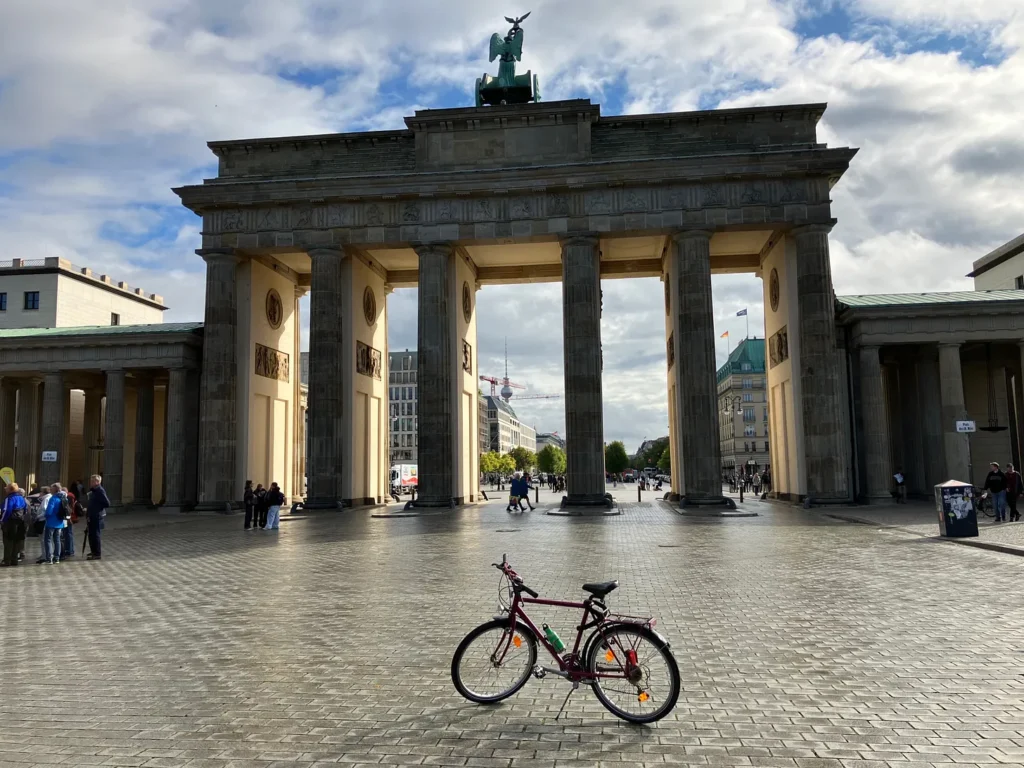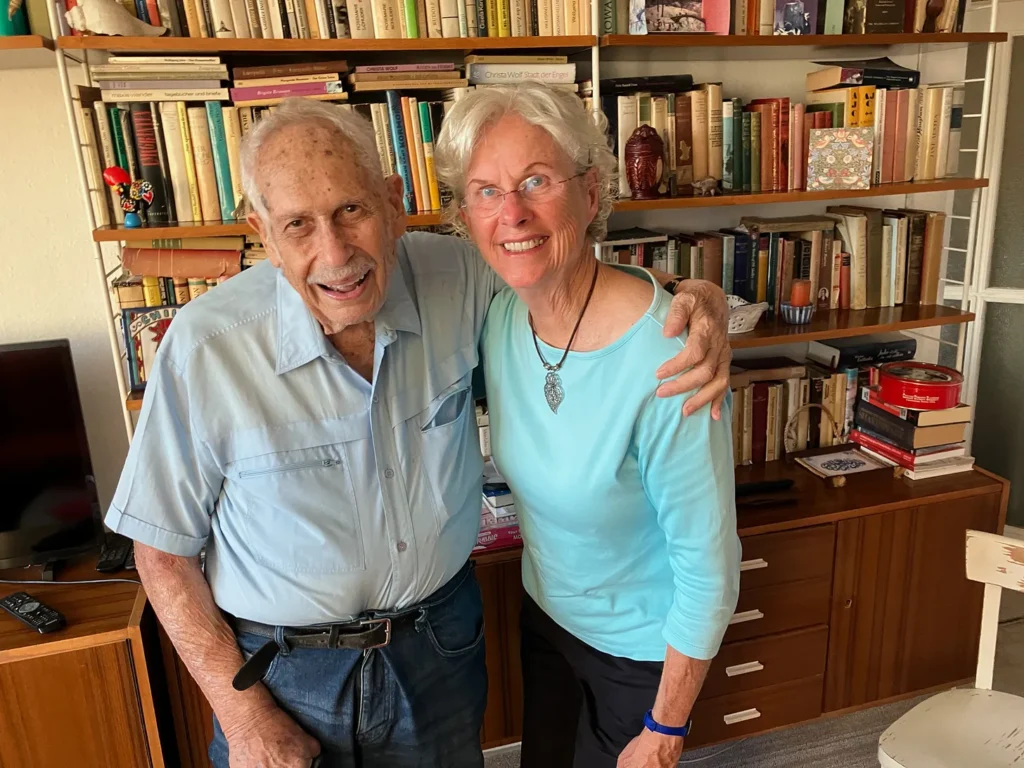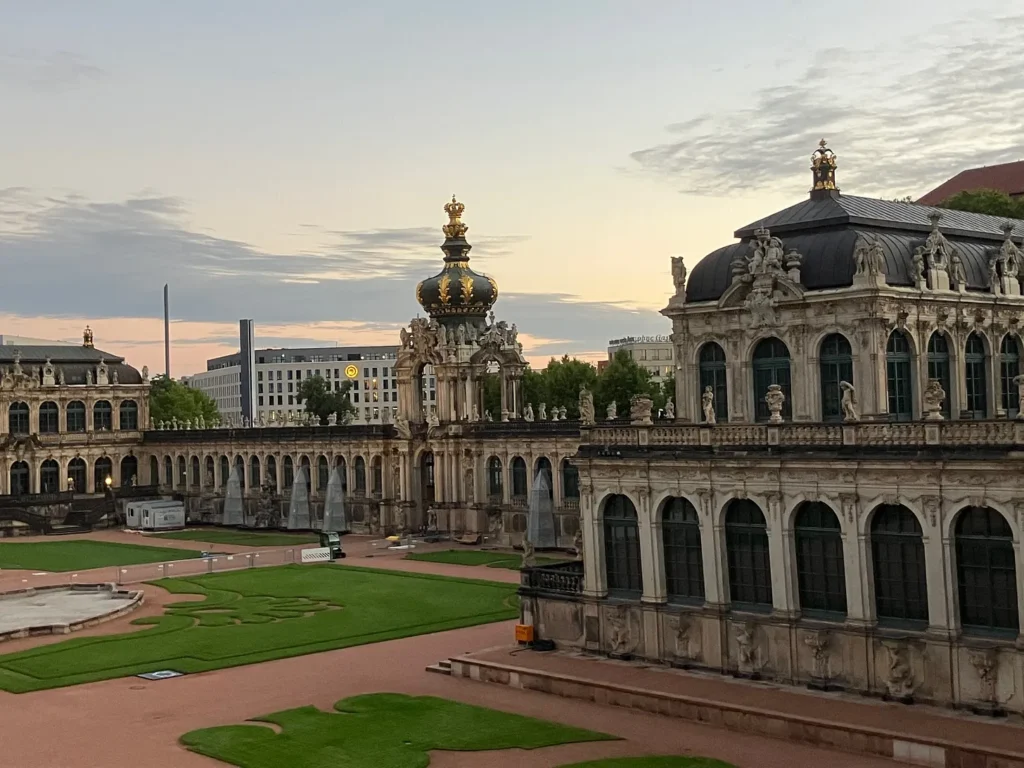35 Years since Germany’s Turning Point
EDITORIAL, 6 Oct 2025
#919 | Marilyn Langlois – TRANSCEND Media Service
On a recent visit to the German capital, I got a close look at the entire 160 kilometer Berlin Wall bicycle and pedestrian path (Berliner Mauerweg) along the route that enclosed West Berlin like an island during the Cold War. What once imposed separation and sowed hostility has transitioned into an inclusive and welcoming recreation zone, emblematic of a trend one might encourage not only for all of Germany but for the whole world.
Dominant narratives applauding the new Germany tend to universally condemn the GDR as a repressive police state, citing its infamous Stasi and harsh travel restrictions. Both can also be seen as overly zealous measures to counteract rampant covert CIA operations to sabotage the GDR’s socialist system from within and lure its best and brightest out of the country.
During 28 years of the Berlin Wall’s existence, from 1961-1989, 5,075 easterners managed successfully to reach West Berlin, while 3,200 were arrested in their attempt. GDR border guards unjustly killed 128 people trying to flee, all of whom are memorialized to this day with monuments at the site of their deaths.
While defections from East to West have been widely publicized for decades, less known are the stories of voluntary defections in the other direction. In 1952, at the height of McCarthy era Stasi-esque witch hunts in the US, Victor Grossman, a young American soldier stationed in still occupied Austria, was facing arrest and severe punishment for his previous affiliation with communist groups in the US.
Disheartened by the US’ unconstitutional red-baiting, he escaped to the Soviet sector by swimming across the Danube river in the middle of the night. He was offered residence, work, and advanced university education in East Germany, where he married, raised a family, pursued his career and never looked back. To this day, at age 97, he resides in the same modest, well-maintained apartment on a broad Berlin boulevard that his family moved to over 60 years ago.
An engaging journalist, lecturer and author, Grossman wrote two books about his personal experiences and broader political reflections: A Socialist Defector: From Harvard to Karl-Marx-Allee, and Crossing the River: A Memoir of the American Left, the Cold War, and Life in East Germany. While acknowledging the GDR’s shortcomings, he embraced the overarching principles of human dignity, equality, social cohesion and worker empowerment that the state aspired to and to a great extent achieved.
An all-round Mensch with a kind heart and keen intellect, Grossman appreciated many aspects of GDR life: job security; housing security; free education and health care; ample access to arts, culture, sports and recreation; technological innovation; strong non-discriminatory policies; conscious elimination of any remnants of Nazi ideology; as well as the absence of both abject poverty and excessive personal wealth accumulation.
While happy to see the border between East and West dissolve in 1990, for Grossman the implementation of the Wende came with a sense of loss, watching the fruits of GDR labor stolen by capitalist encroachment, while grandiose promises of a better and more prosperous life made to East Germans by the West and its US promoters remained largely unfulfilled. He watched the political pendulum among much of the disillusioned population in the east swing from left to far right and join the xenophobic and anti-liberal establishment Alternativ für Deutschland (AfD) party which achieved unprecedented success in recent German elections.
US machinations in Germany’s reconfiguration 35 years ago also betrayed Russia’s good will in ways that intensely reverberate today. The dying Soviet Union agreed to the dissolution of the GDR, peaceful removal of Soviet troops from its territory, and the membership of newly expanded Germany in NATO, on condition that NATO’s borders not expand eastward. The US agreed, but promptly broke its promise. To date, 15 countries to the east of Germany have been allowed to join NATO since 1990, placing military threats right on Russia’s borders and provoking the escalation of warfare in Ukraine.
What’s done is done, but could missed opportunities from the past be instructive for the future? Let’s go back to 1952, when Stalin’s proposal for German neutrality and withdrawal of all four occupying powers (Soviet Union, US, UK and France) fell on resolutely deaf ears in the West. Was that such an outrageous idea? It worked in Austria, so why not in Germany? In fact, the Austria Option has been suggested for resolving the current Ukraine crisis.
A neutral and united Germany with no American military bases on its territory might have even spared us the 2003 illegal US war of aggression in Iraq, which relied heavily on the US Ramstein Airforce Base as a staging area for attacking West Asia. And there would be no US base in Wiesbaden to serve as headquarters for coordinating NATO’s proxy war against Russia on Ukrainian territory, which is now the case. Former leftist minority German statesman Oskar Lafontaine put it succinctly in his recent book title: Ami, It’s Time to Go.
Much to its detriment, Germany remains caught up in a needless extension of the Cold War, clinging to its false perception of the US as a trustworthy ally, while demonizing Russia at every turn. Instead of asserting its right to continue importing cheap Russian natural gas, which had fueled its successful industrial economy for over 50 years, its leaders allowed the US to get away with covertly blowing up the Nordstream pipelines two years ago (as documented by Seymour Hersh) and switched to importing much more expensive liquid natural gas from the US. With its domestic economy flagging, current Chancellor Merz recklessly aims to buy more and more weapons for Ukraine with money it doesn’t have, expand Germany’s military and pursue hostility toward Russia over diplomacy.
On my trip I also visited Dresden, with the resplendent beauty of its lovingly restored historic Altstadt along the Elbe River showcasing some of Germany’s finest architecture, art and music venues. Gazing on the magnificent Schloss, Zwinger palace museums and Semperoper opera house, I marveled at the fine craftsmanship of multitudes of humble workers who originally built these structures to benefit only the wealthy royalty of those times, but which are now open to the general public with access for all.
On February 13, 1945, the US and UK mercilessly firebombed this cultural gem, which had zero military value, destroying the city center and killing upwards of 200,000 civilian residents, at a time when the Third Reich was already essentially defeated.
The bombing came right on the heels of the Yalta conference, where future occupation lines in Germany were drawn up. Dresden would be in the Soviet zone. Could it be that virulently anti-communist US and UK destroyed the city out of spite to prevent future GDR citizens under Soviet occupation from enjoying its splendor?
Undeterred, the GDR with limited means and ample volunteer labor initiated Dresden’s reconstruction, which continued after the Wende. A plaque in one of its lofty re-built churches states, translated here in English:
While the destruction of the Frauenkirche church was a result of fanatical nationalism, it stands open today to all people, regardless of their origin, religion, creed or sexual orientation.
Affirming inclusiveness and respect for all is of course laudable, yet the unspoken subtext suggests the Nazi past was so reprehensible that the US and UK were somehow justified in their brutal bombardment of Dresden, clearly a war crime. While Germans rightly seek to atone for the horrendous sins of the Holocaust, they often disregard and even excuse sins committed by their current so-called allies.
Which brings us to Germany’s unswerving yet misguided loyalty to the current state of Israel. Multiple German citizens told me that the horror of wantonly murdering millions of defenseless Jews during WWII justifies support for establishing and maintaining a militarized Jewish state in historic Palestine whose people can defend themselves. Believing Zionist propaganda allows them to overlook 70+ years of settler colonial occupation and widespread abuses against the indigenous Palestinian population. Surely there are other ways to ensure security for both Jews and Palestinians in the region.
If Never again! really means never again, then no one, least of all Germany, should be supporting a state engaged in genocidal atrocities against the residents of Gaza. Berliners especially, who endured 28 years with a wall and checkpoints dividing the heart of their city, ought to denounce Israel’s massive wall and checkpoints that separate, rob, humiliate and oppress West Bank residents. Friends shouldn’t let friends get away with murder.
The US certainly does not set a good example in this regard, what with its own history of unconditional support for Israel and its legacy of genocide of the indigenous population of North America. We US citizens are obligated to hold our own government accountable. I would invite Germans to think twice before looking to the US with its divisive and hegemonic practices as a reliable friend and role model. Both countries can and should do much better.
Imagine the possibilities today of a neutral, non-militarized, egalitarian Germany, harnessing its technical and social know-how to take care of its residents, and engaging in mutually respectful and beneficial diplomatic, cultural and economic exchanges throughout the world.
In Dresden’s Semperoper I attended a performance of Mozart’s Die Entführung aus dem Serail. In it, the young Spaniard Belmonte finds himself captured by the Turkish Pasha Selim, who he expects to exact harsh revenge on him, since Belmonte’s father had previously ruined the Pasha’s life. Instead, the Pasha surprises Belmonte and the audience:
It must be very natural for your family to do wrong, since you assume that I am the same way. But you deceive yourself. I despise your father far too much ever to behave as he did. Have your freedom, take Constanze, sail home, and tell your father that you were in my power, and that I set you free so that you could tell him it is a far greater pleasure to repay injustice with good deeds than evil with evil.
In a scene of the movie Amadeus, Mozart, confronted by Italian opera traditionalists, defends his decision to compose German language operas to highlight German virtues. When asked derisively to name one German virtue, his response silences the naysayers: love.
May we all be guided by love and fidelity to humanity for the next 35 years and beyond.
____________________________________________
 Marilyn Langlois is a member of the TRANSCEND Media Service Editorial Committee and of TRANSCEND USA West Coast. She is a volunteer community organizer and international solidarity activist based in Richmond, California. A co-founder of the Richmond Progressive Alliance, member of Haiti Action Committee and Board member of the International Center for 9/11 Justice, she is retired from previous employment as a teacher, secretary, administrator, mediator and community advocate.
Marilyn Langlois is a member of the TRANSCEND Media Service Editorial Committee and of TRANSCEND USA West Coast. She is a volunteer community organizer and international solidarity activist based in Richmond, California. A co-founder of the Richmond Progressive Alliance, member of Haiti Action Committee and Board member of the International Center for 9/11 Justice, she is retired from previous employment as a teacher, secretary, administrator, mediator and community advocate.
Tags: Berlin, Capitalism, Communism, Europe, German reunification, Germany, Nazism, Russia, Soviet Union, WWII, Wall
This article originally appeared on Transcend Media Service (TMS) on 6 Oct 2025.
Anticopyright: Editorials and articles originated on TMS may be freely reprinted, disseminated, translated and used as background material, provided an acknowledgement and link to the source, TMS: 35 Years since Germany’s Turning Point, is included. Thank you.
If you enjoyed this article, please donate to TMS to join the growing list of TMS Supporters.

This work is licensed under a CC BY-NC 4.0 License.
3 Responses to “35 Years since Germany’s Turning Point”
Join the discussion!
We welcome debate and dissent, but personal — ad hominem — attacks (on authors, other users or any individual), abuse and defamatory language will not be tolerated. Nor will we tolerate attempts to deliberately disrupt discussions. We aim to maintain an inviting space to focus on intelligent interactions and debates.




P.S. Note from the author: I’d like to give a shout out to Kurt Vonnegut’s classic anti-war story, SLAUGHTERHOUSE-FIVE, which, when I read it over 50 years ago, placed a visit to Dresden squarely on my “to do” list.
Alberto Portugheis says:
I have great admiration for Victor Grossman, but, if he really thinks the Communist era was of “strong non-discriminatory policies” and of an “absence of both abject poverty and excessive personal wealth accumulation.”, he is wrong. Grossman, as an American defector, like many years later Edward Snowden, had privileged, VIP treatment, very different from the masses, who I saw and spoke with many times during my concert tours in Soviet countries, that is countries occupied by military force by Russia, slaves of Russian power. I remember carrying with me, for relatives of Eastern Europeans living in the West, things like hand soaps, tins of sardines and corned beef, oranges, used clothing garments, basic items that were sheer luxuries for the common working people.
I dined in musicians’ homes several times. if it was the home of a musician spying for the Communist party, I enjoyed caviar, a selection of foreign drinks, cheeses and hams. In the home of a non-collaborative musician, we shared a sausage between 3 to 5 people and filled our stomachs with potatoes and bread.
A 60-year non-Communist doctor had to walk or use public transport to visit his patients, whilst an 18-year old student, son of a member of the Party, drove a last model car.
With regards to the absence of “excessive personal wealth accumulation.”, perhaps Marilyn Langlois is not aware of the multi millionaires who left Soviet countries immediately after the fall of the wall and became in no time owners of football clubs, 5-star hotels, car manufacturing companies, construction companies, in the UK, France and many other countries.
As to….. might have even spared us the 2003 illegal US war of aggression in Iraq,”, Id like to ´tell Marilyn that ALL WARS are illegal and all wars start with AGGRESSION. This is how politicians can call the War industry “Defense”. By agreement between the fighting parties, one player has to aggress to start kick off the war game.
Had Saddam Hussein not agreed to the Game of War, the US would have easily found another partner. The Government’s obligation is to sell and export what the war industry produces and trains its Armed Forces in the Art of fighting, torturing, killing, destroying buildings, families, societies, the environment and the country´s economy, precisely for such activity.
Very interesting travel and observations!
Thanks for that and also for the critique of German subservience to the US and Israel.
The cultural and historical observations are fascinating.